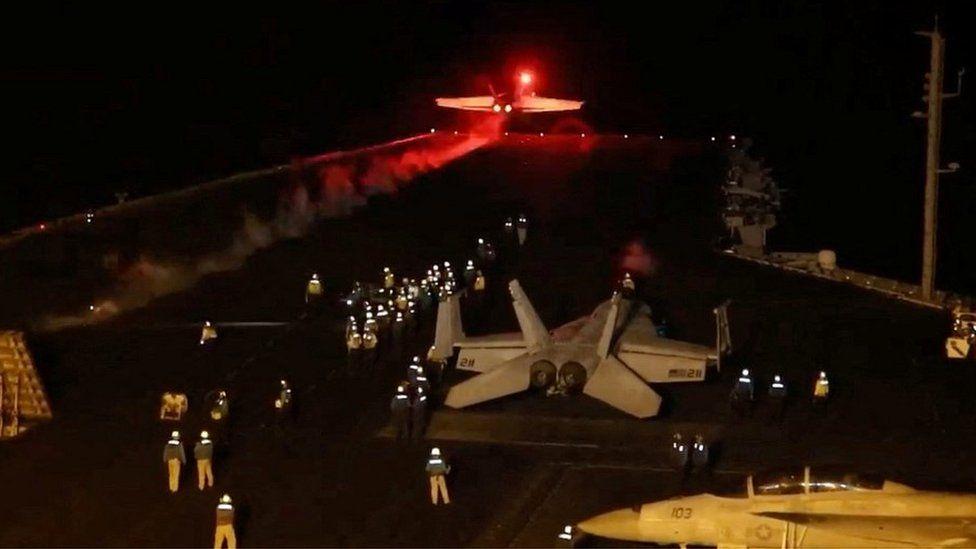Will the US airstrikes trigger a new regional war? Safety is at stake
On January 12, the US and UK militaries launched strikes against multiple targets in Houthi-controlled areas of Yemen, marking a significant response after the Biden administration and its allies warned that the Iran-backed militant group would bear the consequences of repeated drone and missile attacks on commercial shipping in the Red Sea.
Since October 2023, the Houthi, an Iranian-backed Zaydi Shi’a militia operating under the alias Ansar Allah, have engaged in violent operations against international shipping in the vital Red Sea trade route using Iranian missiles, drones, and marine vessels.
Subsequently, the group directed its attacks toward vessels that it claimed had ties to Israel. The attacks have evolved into indiscriminate assaults, which have caused an escalating armed exchange in the Red Sea and its environs, and the potential exists for escalation into a more extensive geographical conflict.
The Houthis claimed they would prevent Israeli ships – or those registered to Israeli owners – from passing through the channel until Israel stopped its attack on Gaza. Since Israel launched its devastating assault and invasion of Gaza after the October 7 attacks by Hamas militants, the world has been anxious about the war spreading into a broader conflict that consumes the Middle East.
Houthis frequent attacks on trade vessels significantly disrupted the global trade in the Red Sea. Global trade fell in December as Houthi attacks on merchant ships in the Red Sea disrupted operations, and it could take months before the trade route is safe to traverse. Ships usually take this route from the south to reach Egypt's Suez Canal further north.

Because of the attacks and the threat of future assaults, several of the world's largest shipping firms, including Mediterranean Shipping Company and Maersk, have diverted vessels away to a much longer route around Africa's Cape of Good Hope and then up the west side of the continent.
The Suez Canal is the quickest sea route between Asia and Europe and is particularly important in oil and liquefied natural gas (LNG) transportation. About nine million barrels of oil per day were shipped through the Suez Canal in the first half of 2023. Indeed, shipping delays will have knock-on effects at container ports across Europe, which are usually highly efficient at handling flows of large numbers of containers.
Oil, natural gas, gas,n and everything from toys to electronics typically travel through the waterway separating Africa and the Arabian Peninsula route to the Suez Canal, where 12% of the world’s trade passes. As such, the security threat in the Red Sea could see prices double over the next few weeks.
In this vein, the US announced a multi-nation operation last week to safeguard maritime commerce in the Red Sea. As part of the measure, Britain, Bahrain, Canada, France, Italy, the Netherlands, Norway, Seychelles, and Spain will stage joint patrols in the southern Red Sea and the Gulf of Aden.

Undoubtedly, global logistic companies will use alternative routes for a while until the Houthi threat is absorbed. However, the additional risk represented by other routes around Africa is the growing threat of piracy in the Gulf of Guinea and elsewhere along the coast of southwest Africa. According to the International Maritime Bureau (IMB) of the Commercial Crime Services (ICC), Nigerian piracy attacks have risen and are at their greatest level since 2008.
The Western and allies' attacks on Yemeni Houthis will unlikely eradicate the security problem, though they will exert additional pressure on the Iranian-backed proxy group. Shortly after the attack, the Ansar Allah movement vowed retaliation to the US brutal attacks, claiming that ship attacks would continue in the Red Sea.
As such, the Houthis would specifically target US and UK ships in the Red Sea as an act of revenge, which in turn could inflame a broader regional conflict in addition to the Gaza War. Iran and Hezbollah condemned the attack, while a Houthi spokesperson said the strikes were not justified and the group would continue targeting ships heading towards its enemy, Israel.
Considering Iran's continuous military and technical support to Houthis, the US, and UK air strikes will intensify in the next few weeks in order to alleviate the situation in the Red Sea and diminish Iran's role in the Red Sea region.








